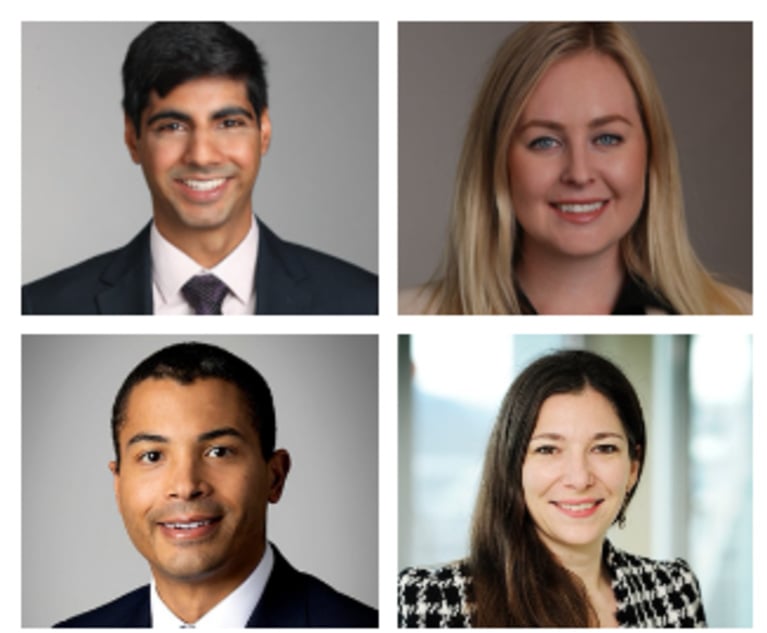The 2018 China 45: new rankings shed light on partner profits at country's top firms
For the first time, this year's rankings include PEP figures for all 45 firms on the revenue list
September 25, 2018 at 06:00 PM
9 minute read
The original version of this story was published on The American Lawyer
Growing trade tension with the US and a slowdown in cross-border M&A have not curbed the growth of China's largest law firms. Quite the contrary. Those firms saw steady financial growth in 2017.
For the first time, two law firms that have more than three-quarters of their lawyers based in mainland China are on the Global 100 revenue ranking: Yingke, with $445.6m at 97th and Zhong Lun, with $444m at 98th.
The two firms take third and fourth place, respectively, on our ranking of the top-grossing Chinese firms, which has expanded to a total of 45 firms with $7.43bn in total revenue. Not surprisingly, Dentons tops the list with $2.36bn in global revenue, while Sino-Australian giant King & Wood Mallesons (KWM), recovering from a major crisis in Europe, remains at second with $1.07bn in revenue.
Ten Chinese firms, including AllBright, DeHeng, Grandall, JunHe, Fangda and Jincheng Tongda & Neal, exceeded $100m in 2017 revenue. Twenty-five firms reported revenue above $50m, up from 19 a year earlier.
To compile the rankings, we asked Chinese law firms to report their gross revenue and profit for the calendar year 2017, as well as their full-time lawyer equivalents and number of equity partners. In a few cases where firms did not provide census or financial figures, we made estimates based on our own reporting.
This year, for the first time, we are also publishing profits per equity partner (PEP) figures for all 45 firms ranked on the revenue list.
Yingke and Zhong Lun's appearance on this year's Global 100 is one of the most remarkable changes in the annual list. Until now, the only Chinese firms on the Global 100 were Dentons and KWM, and both of those firms draw significant revenue from mature markets such as the US, the UK and Australia, where fees are higher. In contrast, 78% of Yingke's 7,438 lawyers and 92% of Zhong Lun's 1,680 lawyers are based in mainland China.
Ten Chinese firms exceeded $100m in 2017 revenue and 25 reported revenue above $50m
Beijing-based Yingke reported 45.9% revenue growth last year, following 51% growth from 2015 to 2016. But the world's second-largest law firm by headcount is loosely structured, consisting mostly of small-to-medium-sized local firms operating under the same brand. Growth was mainly driven by work in intellectual property, data protection and cybersecurity, according to global managing partner Mei Xiangrong, who is expecting another 35% revenue increase in 2018.
Zhong Lun's revenue grew 19% in 2017 and broke the $400m mark for the first time. A full-service firm, Zhong Lun is one of China's most active firms in big-ticket, cross-border work. Last year, the firm opened a new office - its 15th - in the eastern Chinese city of Hangzhou, home to e-commerce giant Alibaba. It also acted for a consortium led by Citic and The Carlyle Group on a $2bn acquisition of the China business of McDonald's, and successfully represented the Chinese Government on the country's first-ever investment treaty arbitration before a tribunal at the International Centre for Settlement of Investment Disputes in Washington DC.
The largest revenue growth in the China 45 was from 10th-ranked Jincheng Tongda & Neal, a Beijing-based firm best known for advising Chinese companies on anti-dumping proceedings in foreign jurisdictions, particularly in the US. In 2017, Jincheng Tongda reported $103.6m in gross revenue - an 80% jump from 2016′s $57.5m. The growth is largely due to the firm's expansion in head count, which rose by 74% to 1,060 last year. It also opened a new office in the vibrant e-commerce hub of Hangzhou and expanded its existing Shanghai office.
- China 45 Ranked by Revenue
- China 45 Ranked by Profits per Equity Partner
- China 45 Ranked by Revenue per Lawyer
The 45 top-grossing firms in China had an average revenue per lawyer (RPL) of $183,622 in 2017, less than one-fifth of the Global 100′s average of $933,477. MWE China Law Offices, the Shanghai-based associate firm of McDermott Will & Emery, tops the list with $609,000 in RPL; it's also the only firm on the list that broke the $500,000 mark. More than half (28) of the 45 firms reported RPL between $50,000 and $200,000.
Law firms, both global and domestic, still face strong fee pressures in China, where legal fees have long been lower than in markets such as the US and the UK. Most Chinese domestic firms, which have been in existence for 30 years or less, have traditionally focused on growth in headcount rather than on average financial capability.
Still, a group of elite firms has managed to stand out from the rest. In 2017, the average RPL at the 10 highest-ranked Chinese firms was $389,000 - twice the average for all 45 firms and six times the average for the 10 firms reporting the lowest RPL. Only one out of this year's top 10 RPL firms is different from last year - eighth-ranked trial and appellate boutique Tiantong & Partners ($282,000), which ranks number 45 on the total revenue chart; Zhong Lun ($264,000) fell to 12th from last year's 10th place. (Tiantong was not on last year's total revenue list, which ranked only the 40 highest-grossing firms.)
Average PEP at the 10 most profitable Chinese firms was $1.05m
Seven firms - Llinks ($496,000), JunHe ($487,000), KWM ($388,000), Haiwen & Partners ($370,000), Han Kun ($364,000), Fangda ($349,000) and Dentons ($273,000) - have been in the RPL top 10 for three years in a row, and all are the usual suspects in big-ticket transactions work. Last year, KWM, JunHe, Fangda and Han Kun shared roles on a $12bn deal that saw Hong Kong-listed state-owned telecom giant China Unicom bring in private investors as part of an ownership reform.
This year we also rank all 45 Chinese firms by PEP, and the results show even greater disparities between the leading group and the rest of the firms on the list. The 45 firms had an average PEP of $474,911 - about a quarter of the $1.833m average PEP of the Global 100.
The most profitable Chinese firms are actually not too far from their global peers, however. The 10 Chinese firms with the highest PEP - the only firms that hit $800,000 or more - reported an average PEP of $1.052m. The 10 firms with the lowest PEP reported an average of $86,000 - less than 10% of the top 10.
Leading the PEP chart again in 2017 is MWE China ($1.417m), which has four equity partners and is a compliance and government enforcement specialist; the rest of the top 10 includes KWM, Han Kun, JunHe, Fangda, Llinks, Haiwen and Zhong Lun.
Most of these firms also rank high on the RPL chart; one outlier is Beijing-based intellectual property litigation firm Chang Tsi & Partners, which reported $1.184m in PEP, the second-highest among all 45 firms. The firm typically represents multinationals in patent and trademark infringement lawsuits in China. Despite a high PEP, the firm's RPL was only $64,000. In 2017, Chang Tsi had 205 lawyers but only two equity partners - co-founders Spring Chang and Simon Tsi. The firm also had 10 non-equity partners, whose compensation ranged from $740,000 to $2.2m. (Chang Tsi expanded its equity tier and included a third equity partner in 2018.)
It's not surprising that the Chinese firms with higher RPL and PEP overlap with the group that frequently gets high-stake cross-border mandates. Fees tend to be higher for cross-border matters than pure domestic matters. And working on those matters also gives Chinese firms more exposure to how global firms operate. Despite their varied business models, elite Chinese firms, more influenced by Big Law, tend to operate in a more centralised way and have a better risk-control system in place than the rest of the pack. This makes them more attractive to big multinational mandates.
Ultimately, the growing financial strength of Chinese firms is helping them compete in the global market. Many of the most profitable Chinese firms are also the most aggressive lateral recruiters of partners from their international counterparts. Beijing-based Han Kun, which managed to hire away White & Case's former China head, Li Xiaoming, and Clifford Chance's former China financial regulatory practice leader, Yang Tiecheng, had PEP of $1.073m last year. And Fangda, which had PEP of $1.13m, convinced former Linklaters Asia head Shao Zili to join as a non-executive chairman in 2017. In early 2018, the firm hired Linklaters China head Fang Jian.
In 2018, the Chinese firms' hiring spree has continued and firms further down in the rankings also joined the race for top talent. A full-blown China-US trade war has sent more nervous clients to their lawyers, and changes in initial public offerings in Hong Kong have resulted in a much-needed uptick in listing work for capital markets lawyers. Jingtian & Gongcheng, with its $208,000 in 2017 RPL and $466,000 in PEP, persuaded former Mayer Brown China practice head Elaine Lo to launch a new Hong Kong office for the firm. Beijing-based Tian Yuan Law Firm, which reported $174,000 in RPL and $434,000 in PEP in 2017, hired away Shearman & Sterling lawyer William Ji to open a six-lawyer office in Hong Kong.
More than anywhere else, Hong Kong is becoming a prime battleground for top talent among Chinese and international firms, at least in the capital markets space, says Shawn Chen, a director of legal recruiter SSQ's China business. "They already have all the Chinese issuers' clients," he says. "All they need now is the execution capabilities."
For more, see:
This content has been archived. It is available through our partners, LexisNexis® and Bloomberg Law.
To view this content, please continue to their sites.
Not a Lexis Subscriber?
Subscribe Now
Not a Bloomberg Law Subscriber?
Subscribe Now
NOT FOR REPRINT
© 2025 ALM Global, LLC, All Rights Reserved. Request academic re-use from www.copyright.com. All other uses, submit a request to [email protected]. For more information visit Asset & Logo Licensing.
You Might Like
View All

The LatAm Top 30, 2024: Ranking the Largest Law Firms in Latin America and the Caribbean by Headcount


Private Equity Rising Stars: The Best Up-and-Coming Lawyers in the UK and Europe, 2024
26 minute readTrending Stories
Who Got The Work
J. Brugh Lower of Gibbons has entered an appearance for industrial equipment supplier Devco Corporation in a pending trademark infringement lawsuit. The suit, accusing the defendant of selling knock-off Graco products, was filed Dec. 18 in New Jersey District Court by Rivkin Radler on behalf of Graco Inc. and Graco Minnesota. The case, assigned to U.S. District Judge Zahid N. Quraishi, is 3:24-cv-11294, Graco Inc. et al v. Devco Corporation.
Who Got The Work
Rebecca Maller-Stein and Kent A. Yalowitz of Arnold & Porter Kaye Scholer have entered their appearances for Hanaco Venture Capital and its executives, Lior Prosor and David Frankel, in a pending securities lawsuit. The action, filed on Dec. 24 in New York Southern District Court by Zell, Aron & Co. on behalf of Goldeneye Advisors, accuses the defendants of negligently and fraudulently managing the plaintiff's $1 million investment. The case, assigned to U.S. District Judge Vernon S. Broderick, is 1:24-cv-09918, Goldeneye Advisors, LLC v. Hanaco Venture Capital, Ltd. et al.
Who Got The Work
Attorneys from A&O Shearman has stepped in as defense counsel for Toronto-Dominion Bank and other defendants in a pending securities class action. The suit, filed Dec. 11 in New York Southern District Court by Bleichmar Fonti & Auld, accuses the defendants of concealing the bank's 'pervasive' deficiencies in regards to its compliance with the Bank Secrecy Act and the quality of its anti-money laundering controls. The case, assigned to U.S. District Judge Arun Subramanian, is 1:24-cv-09445, Gonzalez v. The Toronto-Dominion Bank et al.
Who Got The Work
Crown Castle International, a Pennsylvania company providing shared communications infrastructure, has turned to Luke D. Wolf of Gordon Rees Scully Mansukhani to fend off a pending breach-of-contract lawsuit. The court action, filed Nov. 25 in Michigan Eastern District Court by Hooper Hathaway PC on behalf of The Town Residences LLC, accuses Crown Castle of failing to transfer approximately $30,000 in utility payments from T-Mobile in breach of a roof-top lease and assignment agreement. The case, assigned to U.S. District Judge Susan K. Declercq, is 2:24-cv-13131, The Town Residences LLC v. T-Mobile US, Inc. et al.
Who Got The Work
Wilfred P. Coronato and Daniel M. Schwartz of McCarter & English have stepped in as defense counsel to Electrolux Home Products Inc. in a pending product liability lawsuit. The court action, filed Nov. 26 in New York Eastern District Court by Poulos Lopiccolo PC and Nagel Rice LLP on behalf of David Stern, alleges that the defendant's refrigerators’ drawers and shelving repeatedly break and fall apart within months after purchase. The case, assigned to U.S. District Judge Joan M. Azrack, is 2:24-cv-08204, Stern v. Electrolux Home Products, Inc.
Featured Firms
Law Offices of Gary Martin Hays & Associates, P.C.
(470) 294-1674
Law Offices of Mark E. Salomone
(857) 444-6468
Smith & Hassler
(713) 739-1250









